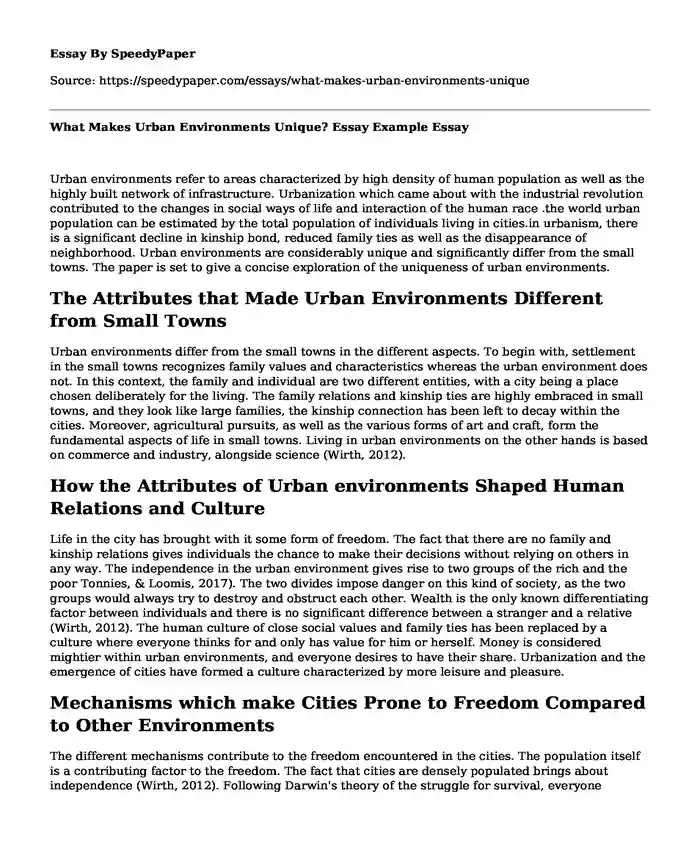Urban environments refer to areas characterized by high density of human population as well as the highly built network of infrastructure. Urbanization which came about with the industrial revolution contributed to the changes in social ways of life and interaction of the human race .the world urban population can be estimated by the total population of individuals living in cities.in urbanism, there is a significant decline in kinship bond, reduced family ties as well as the disappearance of neighborhood. Urban environments are considerably unique and significantly differ from the small towns. The paper is set to give a concise exploration of the uniqueness of urban environments.
The Attributes that Made Urban Environments Different from Small Towns
Urban environments differ from the small towns in the different aspects. To begin with, settlement in the small towns recognizes family values and characteristics whereas the urban environment does not. In this context, the family and individual are two different entities, with a city being a place chosen deliberately for the living. The family relations and kinship ties are highly embraced in small towns, and they look like large families, the kinship connection has been left to decay within the cities. Moreover, agricultural pursuits, as well as the various forms of art and craft, form the fundamental aspects of life in small towns. Living in urban environments on the other hands is based on commerce and industry, alongside science (Wirth, 2012).
How the Attributes of Urban environments Shaped Human Relations and Culture
Life in the city has brought with it some form of freedom. The fact that there are no family and kinship relations gives individuals the chance to make their decisions without relying on others in any way. The independence in the urban environment gives rise to two groups of the rich and the poor Tonnies, & Loomis, 2017). The two divides impose danger on this kind of society, as the two groups would always try to destroy and obstruct each other. Wealth is the only known differentiating factor between individuals and there is no significant difference between a stranger and a relative (Wirth, 2012). The human culture of close social values and family ties has been replaced by a culture where everyone thinks for and only has value for him or herself. Money is considered mightier within urban environments, and everyone desires to have their share. Urbanization and the emergence of cities have formed a culture characterized by more leisure and pleasure.
Mechanisms which make Cities Prone to Freedom Compared to Other Environments
The different mechanisms contribute to the freedom encountered in the cities. The population itself is a contributing factor to the freedom. The fact that cities are densely populated brings about independence (Wirth, 2012). Following Darwin's theory of the struggle for survival, everyone struggles to outlive the others with the dense populations.
Additionally, technological progress has enabled individuals to achieve an absolute form of freedom as they do not see the needs of consulting family members and folks on issues which can be solved technologically. Moreover, the segregation and diversity regarding the urban populations bring about the carefree attitude. The fact that people merge from different backgrounds leads to the weakening of the close bonds leading to some aspects of freedom and independence. Everyone gets to mind their own business, citing the fact that their neighbors are of no close relations (Fuller & Moore, 2017)
In conclusion, it is right to note that the urban environment is unique and does not have characteristics similar to other settings such as the small towns. The distinctive features have been attributed by the different factors such as the population as well as the technological advancements. The nature of urban environments has therefore significantly impacted the culture and human relations.
References
Fuller, M., & Moore, R. (2017). The death and life of great American cities. Macat Library.
Tonnies, F., & Loomis, C. P. (2017). Community and society. Routledge.
Wirth, L. (2012). Urbanism as a way of life. In The Urban Sociology Reader (pp. 46-55). Routledge.
Cite this page
What Makes Urban Environments Unique? Essay Example. (2022, Sep 19). Retrieved from https://speedypaper.net/essays/what-makes-urban-environments-unique
Request Removal
If you are the original author of this essay and no longer wish to have it published on the SpeedyPaper website, please click below to request its removal:
- Free Essay about BP Oil Spill
- Free Essay Containing the Reference Letter for Chevening Award
- Technology Essay Example on Information Security Management System
- A Look into Osugi Sakae's Life, Biographical Essay Sample
- Distance Education or Traditional Education? Free Essay Sample
- Essay Sample on Construct Validity
- Paper Example - Binge-Watching TV
Popular categories





